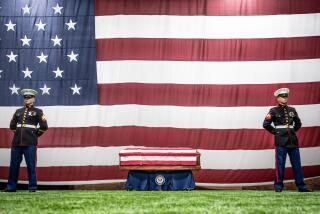Purple Hearts for domestic terror victims? Lawmakers say it’s time
WASHINGTON — The Purple Heart dates back to 1782 when Gen. George Washington created the Badge of Military Merit to recognize meritorious action. The medal, which features a likeness of Washington, fell into disuse after the Revolutionary War but was brought back in 1932 and is awarded to members of the military killed or wounded in combat.
Bipartisan legislation has been introduced in Congress to expand the eligibility for the medal to include members of the armed forces killed or wounded in a domestic terrorist attack -- an effort to recognize military victims of the 2009 shootings at Ft. Hood, Texas, and at a Little Rock, Ark., military recruiting station.
“The unfortunate fact is that members of our armed forces are at risk of being attacked by the enemy – Al Qaeda and its adherents – not only when deployed overseas but also while stationed here at home,’’ said Rep. Peter King (R-N.Y.), chairman of the Homeland Security Committee, who has introduced one of the bills.
Purple Hearts were awarded to military victims of the Sept. 11, 2001, terrorist attacks. Currently, members of the armed forces can receive the medal if they were killed or wounded “to an extent requiring treatment by a medical officer; in action against an enemy of the United States; as the result of an act of any hostile foreign force; or as the result of an international terrorist attack against the United States, provided the secretary of the military department concerned recognizes the attack as an international terrorist attack,’’ according to the Defense Department.
King’s bill would remove the distinction between domestic and international terrorism by expanding eligibility to military victims of “a terrorist attack within the United States perpetrated by an individual or individuals expressing a political, religious or ideological obligation to engage in unlawful violence directed against United States military operations or foreign policy.’’
A similar bill has been introduced in the Senate by Sen. Joe Lieberman (I-Conn.), chairman of the Senate Homeland Security and Governmental Affairs Committee.
“Congress has historically acted to ensure that the recognition we award to our service members keeps pace with the threats they face,’’ Lieberman said in a statement.
“The shootings outside the Little Rock recruiting center underscore that there are no front lines when it comes to terrorism,” said Sen. Mark Pryor (D-Ark.), a cosponsor of the bill. “When a soldier signs up to serve and becomes a target of terrorism as a result, the least we can do is ensure he or she receives the proper honors and recognition.”
According to Arkansas’ senators, the Army did not recognize the Little Rock shootings as an international terror attack because federal charges were not filed against Abdulhakim Mujahid Muhammad, sentenced last year to life without parole for killing one Army soldier and wounding another. Police said Muhammad told them he carried out the shootings to protest the U.S. military and “what they had done to Muslims in the past.”
Separately, language has been written into a defense bill headed to the House floor that would award the medal to the military victims of the Ft. Hood and Little Rock shootings.
In the Ft. Hood attack, Army Maj. Nidal Malik Hasan is due to go on trial in August, accused of killing 13 people and wounding 32.
There have been changes in the eligibility for the award over the years.
President Kennedy in 1962 signed an executive order expanding the eligibility to service members wounded in any armed conflict in which the U.S. is engaged, making it possible for service members to receive the medal for wounds suffered in Vietnam. Before that, eligibility was limited to declared wars.
Later that same year, Army policy was modified to allow prisoners of war to receive the medal if wounded or injured by their captors.
John Bircher, national director of public relations for the Military Order of the Purple Heart, an organization of about 45,000 Purple Heart recipients, said in an interview that he considers the legislation “not necessary. The criteria already includes acts of terrorism.”
ALSO:
Paul Babeu, gay Arizona sheriff, drops congressional bid
Bristol Palin ridiculing Obama on gay marriage? Cue the backlash
Time magazine breastfeeding cover: A shocking ‘stroke of genius’
richard.simon@latimes.com
More to Read
Sign up for Essential California
The most important California stories and recommendations in your inbox every morning.
You may occasionally receive promotional content from the Los Angeles Times.











